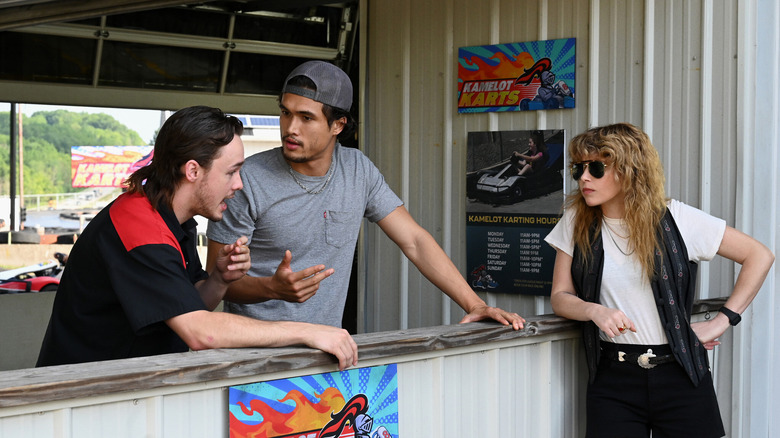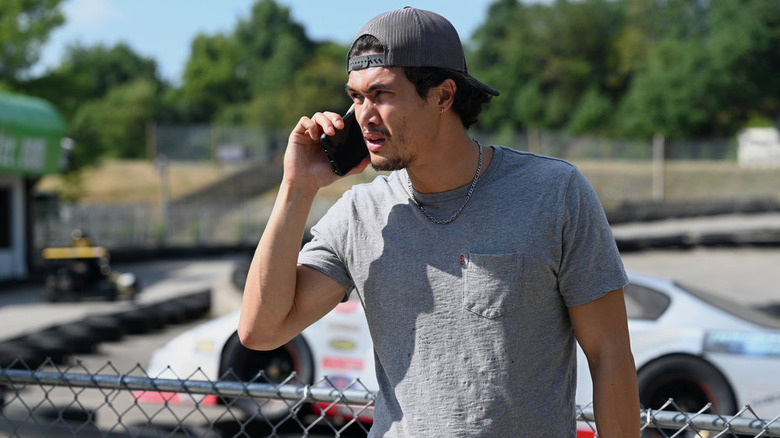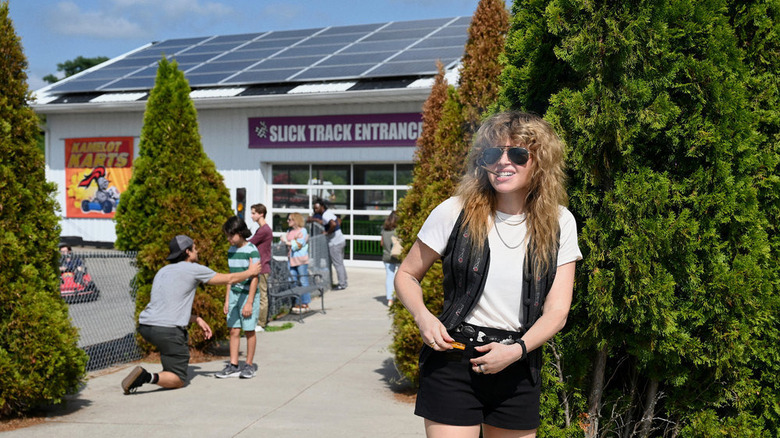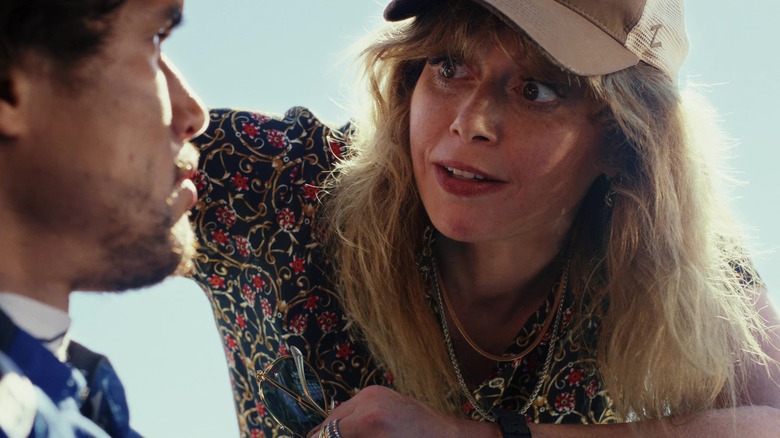Poker Face's Race Car Killer Was The Smartest Psycho Of Season 1
This article contains spoilers for season 1 of "Poker Face."
"Poker Face" is a formulaic show, and that's not a complaint. In a TV landscape where everything feels increasingly serialized, there's something refreshing about a simple case-of-the-week style detective show. Every episode has the same basic format: we watch as a murder scenario plays out, we cut back to reveal how the on-the-run drifter Charlie (Natasha Lyonne) was nearby at the time, and then we watch as Charlie slowly figures out the situation. Once she does, she then has to figure out how to get justice without putting herself back on the grid.
That might sound repetitive, but "Poker Face" always seems to find a fresh way to play with the formula. Sometimes the victim in the opening sequence turns out to be Charlie herself (long story there), or sometimes another character figures out the mystery before Charlie does. Perhaps the biggest twist to the format, however, happens in "The Future of the Sport," in which the initial victim, Davis McDowell (Charles Melton), turns out to be the actual murderer.
Although the opening scene shows us race-car driver Kyle Owens (Tim Blake Nelson) messing with his rival McDowell's car, it's only later in the episode that we realize McDowell witnessed Owens in the act. Instead of simply alerting the police or fixing the tampering, however, McDowell chooses to tamper his own car even further. The next day at the track, he lets Owens' daughter Katy (Jasmine Aiyana Garvin) drive his car. It's a shockingly evil act: McDowell doesn't just try to kill Owen's daughter, but he makes Owen think he's the one responsible.
What makes McDowell unique
The twist in the structure wouldn't be enough to set McDowell above the pack, however. No, what makes McDowell particularly remarkable as a "Poker Face" villain is the way he learns Charlie's superpower ahead of time, and he uses it to his advantage.
When the show's first episode revealed Charlie's near-supernatural ability to always know when a person was intentionally lying, some fans worried that this would limit the show too much. It's an interesting superpower that the show constantly uses in fresh ways, but in episodes like "Rest in Metal" or "The Night Shift," it sometimes feels like it makes things too easy for her. The murderers Charlie meets often have no reason to suspect they've got a human lie detector in their midst, so Charlie's typically able to catch on to them straight away. The episodes often barrel through the question of whether Charlie will figure out the killer, and dives straight into figuring out how she's going to prove it.
McDowell, however, has the advantage of knowing ahead of time what Charlie's capable of. While you'd think this would encourage him to simply not attempt murder in her presence, McDowell instead has the hubris to think he can successfully manipulate this human lie detector in his favor. The crazy part is that his hubris is almost justified: using just the right amount of selective truths, he manages to put Charlie on Owens' trail without ever implicating himself. Because there is genuine truth to his accusation (Owens did tamper with his car, after all), McDowell almost becomes the only "Poker Face" villain to fully outsmart Charlie.
He would've gotten away with it, too
In the end, McDowell draws Charlie's suspicion not because of any real strategic blunder, but because Charlie just so happened to be nearby at the wrong time. If McDowell hadn't lied to a random kid close to where an out-of-sight Charlie had stopped to smoke, he would've gotten away scot-free, and Owens would've spent the rest of his life thinking he was responsible for putting his daughter in a coma. That's what makes McDowell so unique among the killers in this series: everyone else gets caught due to their own arrogance or sloppiness, but he plays Charlie like a fiddle, and only gets caught simply because of bad luck.
And yet despite his blunder, McDowell still never truly gets caught in the way the other villains on this show do. Charlie doesn't have a strong case against him, and he has sufficiently intimidated her into leaving town. (The scene where McDowell's truck nearly forces Charlie off the road feels straight out of a horror film.) His comeuppance comes not in the form of police officers knocking on his front door, but in the guilt that hits him just as he's achieved everything he thought he wanted. Charlie tells him about how Owen's daughter is making a fast recovery, and how her racing career will be motivated by revenge whereas his career will be motivated by fear. The episode ends with McDowell's hands trembling, just as Owens' hands trembled in the beginning. The message is clear: McDowell might not be going to jail, but he'll never be happy until he turns himself in.
Should he have suffered more?
"The Future of the Sport" is one of the more controversial episodes of the first season, mainly because it's one of the few episodes where the villain doesn't get a traditional form of comeuppance. Considering Charlie's other foes typically end up going to prison, the closing promise that McDowell's racing career won't be successful doesn't feel good enough. Yes, there's plenty of poetic justice in the idea that the girl he tried to kill is going to inevitably outshine him on the race track, but McDowell's still an attempted murderer, and it's easy to imagine him finding a way to compartmentalize his guilt and gracefully move on.
Overall, however, McDowell getting away with it is a smart move for the show. It's another reminder of how Charlie isn't a police officer, nor can she afford to go to the police like a normal citizen. Sometimes she's able to figure out how to expose the criminals she comes across, but this episode makes it clear that sometimes, we'll have to make do with what we can get. Charlie can't take down everyone, but at least she can mess with their heads a little before she goes.



